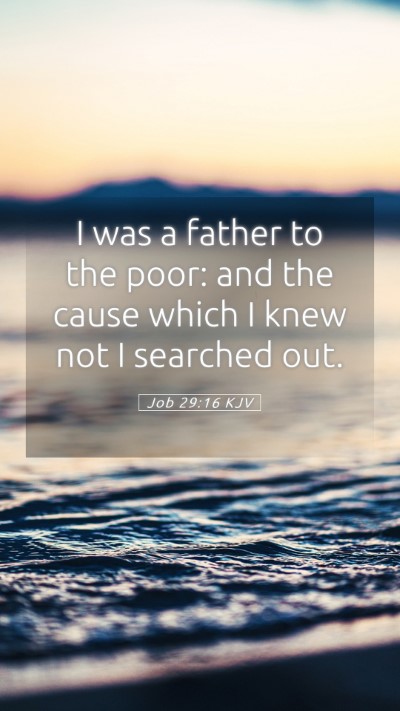Old Testament
Genesis Exodus Leviticus Numbers Deuteronomy Joshua Judges Ruth 1 Samuel 2 Samuel 1 Kings 2 Kings 1 Chronicles 2 Chronicles Ezra Nehemiah Esther Job Psalms Proverbs Ecclesiastes Song of Solomon Isaiah Jeremiah Lamentations Ezekiel Daniel Hosea Joel Amos Obadiah Jonah Micah Nahum Habakkuk Zephaniah Haggai Zechariah MalachiJob 29:16 Meaning
What is the meaning of Job 29:16?
I was a father to the poor: and the cause which I knew not I searched out.
Job 29:16 Bible Verse Meaning
Understanding Job 29:16: A Comprehensive Insight
Job 29:16 states:
"I was a father to the needy, and I searched for God’s justice."
This verse encapsulates Job's role and duties as a man of integrity and compassion, highlighting significant themes of justice and advocacy for the vulnerable. Below is a detailed interpretation derived from public domain commentaries, including insights from Matthew Henry, Albert Barnes, and Adam Clarke.
Overall Context
In the broader context of the Book of Job, this verse is part of Job’s reflection on his past, where he recounts his honorable life before his suffering began. Job expresses a deep sense of loss not only in personal suffering but in his ability to help others.
Verse Analysis
Job 29:16 provides a deep insight into Job’s character and his societal role prior to his affliction. The verse's meaning unfolds in several layers:
- Advocacy for the Needy: Job describes himself as a "father to the needy." This highlights his protective nature and willingness to provide care and support for those who cannot help themselves. Job's life was characterized by active involvement in justice and mercy.
- Pursuit of Justice: The phrase "I searched for God’s justice" implies a proactive and relentless pursuit of righteousness. Job not only proclaimed justice but actively sought to implement it in his community, reflecting a deep-seated commitment to God's principles.
Commentary Insights
Matthew Henry
According to Matthew Henry, Job’s claims of being a father to the needy highlights his role as a benefactor in society. He affirms that true piety is shown in our practical actions towards others, particularly the less fortunate.
Albert Barnes
Albert Barnes emphasizes the moral responsibility of individuals to care for the needy, asserting that Job’s actions exemplify a form of personal integrity and ethical living. Barnes notes that Job's prior benevolence serves as a stark contrast to his current state of misery and abandonment.
Adam Clarke
Adam Clarke reflects on the importance of social justice within this verse, pointing out that Job not only sought justice for others but also exemplified how the faithful should interact with those in need. Clarke argues that this highlights Job’s character as a righteous leader and his integral role within his community.
Application and Relevance
The message of Job 29:16 remains timeless and relevant for contemporary readers. It serves as a reminder of the Christian call to care for the marginalized and oppressed:
- In Personal Life: Individuals are encouraged to seek ways to assist those in need, whether through charitable acts or advocating for justice in society.
- In Group Settings: This verse can serve as a profound topic of discussion for Bible study groups, prompting conversations around social justice and personal responsibility.
- In Spiritual Practices: Online Bible studies can utilize this verse to encourage participants to reflect on their roles in their communities and how they can embody justice in everyday life.
Additional Study Insights
To further enhance understanding, related scriptures can be examined alongside Job 29:16. These include:
- Psalms 82:3: "Defend the poor and fatherless: do justice to the afflicted and needy."
- Proverbs 31:8-9: "Open your mouth for the mute, for the rights of all who are destitute. Open your mouth, judge righteously, defend the rights of the poor and needy."
- Isaiah 1:17: "Learn to do good; seek justice, correct oppression; bring justice to the fatherless, plead the widow's cause."
Conclusion
Job 29:16 serves as a powerful testament to the virtues of compassion and justice that individuals are called to exhibit. Through community engagement and moral integrity, individuals can emulate Job's legacy. As believers seek to understand Scripture, they are reminded of the significant impact they can have in the lives of others.


